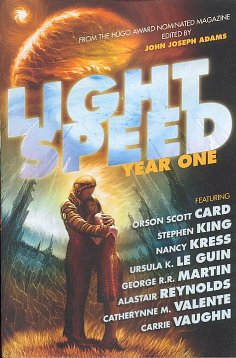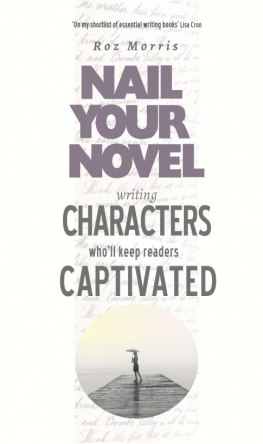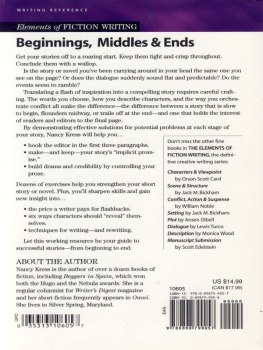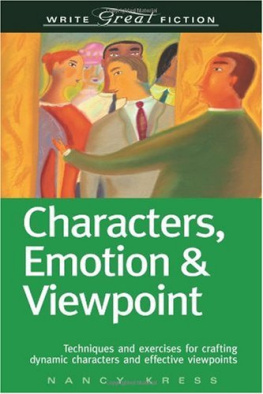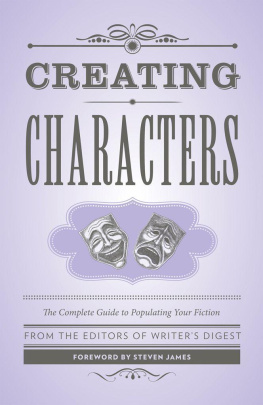
''Character is plot.''
So said novelist Henry James, master of both, a hundred years ago. Unfortunately, in an uncharacteristic burst of taciturnity, James stopped there, leaving several crucial points unexplained. Why is character plot? How do you use your characters to move your plot forward? What kind of characters must you create to make that happen, and how do you create them? And why are characters such a pivotal concern anyway? If you have really exciting events, can't you just plug in people with enough characterization to carry those events out? After all, how much characterization do most best-sellers actually have?
Good questions, all of them. This book will address them in reverse order, starting with: Do you really need strong, complex, original characters to write a book that might sell?
The honest answer to this has to be ''No.'' Pick up certain
best-selling authorsI name no namesand you can't help but notice that their characters have all the depth of wallpaper. And yet the books are dazzling successes, at least in terms of sales. So why labor over creating believable and original characters?
Four reasons, ranging from the cynical to the idealistic. The most cynical reason first.
PUT AS MANY BEST FEET FORWARD AS YOU CAN
Novels that sell to editorsand then to readersmust have at least one strongly appealing characteristic. In books where the plot is all and the characters characterless, that appeal is the exciting events. Some editor bought the book because the events are different, fast-paced, gripping. Readers read it for the same reason. Both editor and readers stick with the book not because the characters are flat, but despite that fact.
So why not give your book more than one quality to catch an editor's interest? A terrific plot earns you one point. A terrific plot plus fascinating characters earns you two. A terrific plot plus fascinating characters plus an eloquent style... but you get the idea.
I said this was a cynical reason for concentrating on characterization. It is. It assumes that your only interest in writing a book is the eventual sales volume. In fact, however, that is almost never true. Writing a novel is a major undertaking, consuming anywhere from several months to several decades, and few people can last through the marathon of writing one if their only motivation is a large print run. Which brings us to the second reason for concentrating on characterization.
WELL, / LIKED HIM!
Those authors with sketchy, hackneyed characters in best-selling books don't believe they're sketchy or hackneyed. I've seldom met a writer who didn't think his protagonist felt very real. The most simpering and savorless romance heroine, stereotyped tough-guy detective, purely evil black-hatted villainit doesn't matter. Their creators see in them depth and interest and reality.
The point of this is not that there are a lot of deluded writers out there (although there probably are). The point is that in order to create a characterthink him up, animate him, stick with him for five hundred pagesa writer has to be enthusiastic about that character. Even if not everybody else is.
Which means you must believe in your characters. Be convinced of their solidity. Feel a quickening of interest as you decide what they'll do next. Care about their fates.
All this is much easier if you have created original, complex, individual characters in the first place, rather than simply plugging in stock characters from other people's fiction (or, worse, from TV). Your interest will come through in the writing. We'll discover more depth in the charactersbecause you have.
THE MULT/FACETED CHARACTER: MANY THINGS TO MANY PEOPLE
We all have different friends for different occasions. With John we share a love of discussing politics. We go to the movies mostly with Karen. Bill is the one we turn to when we're in trouble. Nobody is as good as Terry at organizing interesting vacations.
Characters are like that, too. Some are fitted for only one function: the classic ''spear carriers'' who walk on stage, deliver one line and exit. That's fine, for bit players.
But main characters are another story. Like that wonderful multi-faceted friendthe one we can talk with, rely on and vacation with major characters need to participate in many different kinds of events. To do so believably, they need to have enough complexity so that readers accept them in these multiple roles.
Let's consider an example.
You're writing a book about a manwe'll call him Rogerwho goes through several kinds of hell before he finally realizes that he cannot be responsible for the welfare of his five grown children. You conceive of Roger as a good man, kind and generous. What kinds of events will he participate in during the course of the book?
He will be manipulated by a selfish daughter who plays on his guilt as a parent to get him to support her while she spends her life drinking.
He will face a tough decision about whether to bail out of jail a teenage son who has stolen a caror let him take the consequences of his own act.
He will experience a close bond with one daughter, his favorite childand also experience grief over her death in childbirth.
He will undertake to raise that daughter's infantand be appalled at how much resentment he feels toward this helpless mite who caused her mother's death.
He will love a womanand lose her because he can't seem to make enough time for her while preoccupied with his children's problems.
Do you see what's happening here? Roger will have to growor, rather, your initial conception of him will. Simply thinking of Roger as ''a good man, kind and generous'' is not going to be enough. Your readers must believe him as a man who also experiences guilt, indecision, grief, resentment and passionnot to mention poor judgment. If all we ever see of Roger is his kindness and generosity, the other events of the story won't seem convincing. ''No,'' we'll say, ''I don't believe this guy would really do that.''
In order to believe that yes, he would do that, we need to be given up front a more complex, conflicted and multiply motivated Roger. A man who may indeed be kind and generous, but whose kindness is sometimes misplaced (when?) and whose generosity may have other motives than just benevolence. Perhaps he needs to be in control of everyone around him. Perhaps he can't separate his own self-worth from how good a ''showing'' his children make in life. Perhaps he unconsciously needs them to be weak, so he can be strong. We need to be shown which of these possibilities motivates this particular Roger. We need, in short, a real human being.



